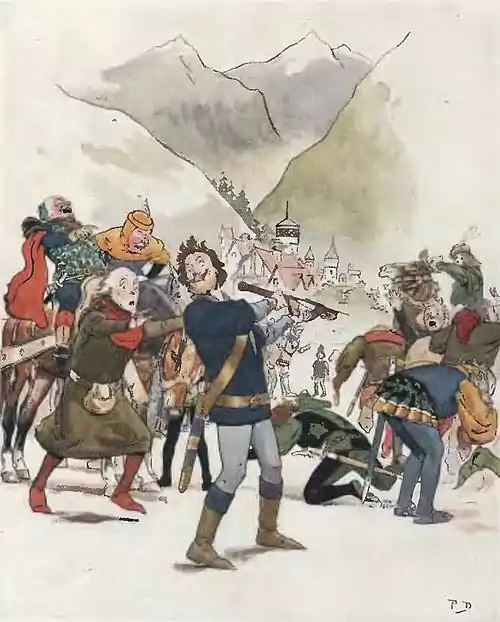CHAPTER X
Gessler came riding up on his brown horse, and the crowd melted away in all directions, for there was no knowing what the Governor might not do if he found them plotting. They were determined to rebel and to throw off his tyrannous yoke, but they preferred to do it quietly and comfortably, when he was nowhere near.
So they ran away to the edge of the meadow, and stood there in groups, waiting to see what was going to happen. Not even Ulric the smith and Ruodi the fisherman waited, though they knew quite well that Tell had not nearly finished his speech. They set the orator down, and began to walk away, trying to look as if they had been doing nothing in particular, and were going to go on doing it—only somewhere else.
Tell was left standing alone in the middle of the meadow by the pole. He scorned to run away like the others, but he did not at all like the look of things. Gessler was a stern man, quick to punish any insult, and there were two of his soldiers lying on the ground with their nice armour all spoiled and dented, and his own cap on top of the pole had an arrow right through the middle of it, and would never look the same again, however much it might be patched. It seemed to Tell that there was a bad time coming.
Gessler rode up, and reined in his horse.
“Now then, now then, now then!” he said, in his quick, abrupt way. “What’s this? what’s this? what’s this?"
(When a man repeats what he says three times, you can see that he is not in a good temper.)
Friesshardt and Leuthold got up, saluted, and limped slowly towards him. They halted beside his horse, and stood to attention. The tears trickled down their cheeks.
“Come, come, come!" said Gessler; “tell me all about it."
And he patted Friesshardt on the head. Friesshardt bellowed.
Gessler beckoned to one of his courtiers.
“Have you a handkerchief?" he said.
“I have a handkerchief, your Excellency."
“Then dry this man’s eyes."
The courtier did as he was bidden.
"Now,” said Gessler, when the drying was done, and Friesshardt's tears had ceased, “what has been happening here? I heard a cry of ‘Help!' as I came up. Who cried ‘Help!'?”
“Please, your lordship’s noble Excellency
PLATE XI. "The bearing," as they say, "of that |
|
ship,” said Friesshardt, “it was me, Friesshardt.”
“You should say, ‘It was I,’” said Gessler. “Proceed.”
“Which I am a loyal servant of your Excellency’s, and in your Excellency’s army, and seeing as how I was told to stand by this ’ere pole and guard that there hat, I stood by this ’ere pole, and guarded that there hat—all day, I did, your Excellency. And then up comes this man here, and I says to him—‘Bow down to the hat,’ I says. ‘Ho!’ he says to me—‘ho, indeed!’ and he passed on without so much as nodding. So I takes my pike, and I taps him on the head to remind him, as you may say, that there was something he was forgetting, and he ups and hits me, he does. And then the crowd runs up with their sticks and hits me and Leuthold cruel, your Excellency. And while we was a-fighting with them, this here man I'm a-telling you about, your Excellency, he outs with an arrow, puts it into his bow, and sends it through the hat, and I don't see how you'll ever be able to wear it again. It's a waste of a good hat, your Excellency—that's what it is. And then the people, they puts me and Leuthold on the ground, and hoists this here man—Tell, they call him—up on their shoulders, and he starts making a speech, when up you comes, your Excellency. That's how it all was."
Gessler turned pale with rage, and glared fiercely at Tell, who stood before him in the grasp of two of the bodyguard.
"Ah," he said, "Tell, is it? Good-day to you, Tell. I think we've met before, Tell? Eh, Tell?"
"We have, your Excellency. It was in the ravine of Schächenthal," said Tell firmly.
"Your memory is good, Tell. So is mine. I think you made a few remarks to me on that occasion, Tell—a few chatty remarks? Eh, Tell?”
“Very possibly, your Excellency.”
“You were hardly polite, Tell.”
“If I offended you I am sorry."
“I am glad to hear it, Tell. I think you will he even sorrier before long. So you’ve been ill-treating my soldiers, eh?”
“It was not I who touched them.”
“Oh, so you didn’t touch them? Ah! But you defied my power by refusing to bow down to the hat. I set up that hat to prove the people's loyalty. I am afraid you are not loyal, Tell.”
“I was a little thoughtless, not disloyal. I passed the hat without thinking.”
“You should always think, Tell. It is very dangerous not to do so. And I suppose that you shot your arrow through the hat without thinking?”
"I was a little carried away by excitement, your Excellency."
"Dear, dear! Carried away by excitement, were you? You must really be more careful, Tell. One of these days you will be getting yourself into trouble. But it seems to have been a very fine shot. You are a capital marksman, I believe?"
"Father's the best shot in all Switzerland," piped a youthful voice. "He can hit an apple on a tree a hundred yards away. I've seen him. Can't you, father?"
Walter, who had run away when the fighting began, had returned on seeing his father in the hands of the soldiers.
Gessler turned a cold eye upon him.
"Who is this?" he asked.
